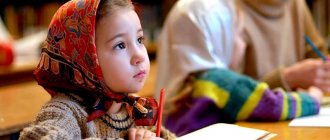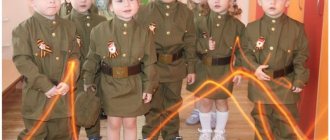The concept and content of spiritual and moral education
Definition 1
Spiritual and moral education is a purposefully organized pedagogical process of assimilation and acceptance by students of cultural, spiritual and moral values.
The essence of spiritual and moral education lies in the consistent expansion and strengthening of the value sphere of the child’s personality, the formation of his ability to find, see, perceive and evaluate beauty on the basis of cultural and moral norms and traditions.
Main directions of spiritual and moral education:
- Fostering love for the Motherland, developing patriotism, respect for the rights and freedom of every person.
- Education of aesthetic consciousness and moral feelings.
- Fostering hard work, a positive attitude towards work, learning and life.
- Formation and development of a value-based attitude towards a healthy lifestyle, one’s health, love and respect for family, nurturing family values.
- Fostering a respectful and valuable attitude towards the surrounding world, nature, and native land.
- Cultivating a value-based attitude towards aesthetically beautiful things, forming ideas about ideals and values.
Are you an expert in this subject area? We invite you to become the author of the Directory Working Conditions
Principles of spiritual and moral education:
- the principle of personal moral example;
- the principle of socio-pedagogical partnership between all participants in the educational process;
- the principle of individuality in education;
- the principle of integration of educational programs;
- the principle of relevance and relevance of education.
“Spiritual and moral education - as the basis for the harmonious development of a student”
• Secondly, in
the modern world, a small person lives and develops, surrounded by many different sources of strong influence on him, both positive and negative, which daily fall on the child’s fragile intellect and feelings, on the still emerging sphere of morality.
• Thirdly , education in itself does not guarantee a high level of moral education, because education is a personality quality that determines in a person’s everyday behavior his attitude towards other people on the basis of respect and goodwill towards each person.
• Fourthly , equipping with moral knowledge is also important because it not only informs the child about the norms of behavior established in modern society, but also gives ideas about the consequences of violating norms or the consequences of this act for the people around him.
The moral education system includes:
• Firstly, understanding and taking into account in the work all sources of moral experience of students. Such sources are: activities (educational, socially useful), relationships between children in a team, relationships between students and teachers and parents, aesthetics of everyday life, the world of nature, art.
• Secondly , the correct balance between forms of activity and education at different age stages.
• Thirdly , the inclusion of moral criteria in the assessment of all types of activities and manifestations of the personality of children without exception. The thing is that education is just a side effect of interaction, deep communication between people, only this gives the effect of education, everything else is the child’s self-adaptation and self-determination. It is not the teacher, not the parents who raise the child, but the child adapts to the behavior of the parents and also adapts to the life situations that make up his life path.
Main sources of moral experience
This is, first of all, an educational activity. The moral development of students in the classroom is carried out through the content of program and didactic material, and the organization of the lesson itself. Educational material, especially in literature and history, has enormous potential for moral influence on schoolchildren. It contains a large number of moral and ethical judgments. During the lessons, the teacher directly leads students to understand their relationship to man and society.
WITH
The personality of the teacher has a strong influence on the moral development of schoolchildren in the learning process.
Each lesson the teacher implements certain goals, and not only those formulated in the plan. The teacher’s behavior, his gestures, his manner of dressing and speaking are reflected in the child’s mind; the nature of communication with him, with other students, under various circumstances; how he behaves with colleagues, how he reacts to the successes and failures of his classmates. The educator or teacher requires students to be careful, disciplined, and to fulfill their duties. And the result will depend on how demanding and consistent the teacher turns out to be. With skillful organization of both educational and extracurricular activities, students develop the foundations of moral behavior and spiritual culture.
Spiritual and moral education of the 17th – early 20th centuries
The era of Peter the Great (1682-1725) changed views on education. In a relatively short period of time, the foundations of a national education system were created in Russia. Before Peter I in Russia, a person was assessed by belonging to one or another class; under Peter I, personal achievements and services to the Fatherland became significant for the first time.
During the era of Peter I, new ideological guidelines began to form in society. Teaching etiquette, foreign languages, and familiarity with Western European fashion influenced the lives and consciousness of people. The worship of everything “foreign” could not but influence the change in approaches to the education and training of young people. In the XVIII. Century in Russia the first educational associations are formed. In the 19th century, various pedagogical projects for the creative, free education of the younger generation were implemented.
The experience of family education became the soil on which the first pedagogical theories “grew”. At first, they did not emphasize the specifics of family upbringing, but used the experience of family upbringing to draw general pedagogical conclusions.
With the advent of public education, the problem of the relationship between family and school in the overall process of education arose. It was solved in different ways - depending on the dominant social system, the philosophical and socio-political views of the thinker or practical teacher. Thus, according to Quintilian, the theorist of oratory in Ancient Rome, public (school) education has more advantages compared to individual (home) education. He wrote: “He who was brought up in solitude will be blinded by the bright shine of the sun and will not find any news for himself when he enters life with his knowledge.”
He identified four stages of development of the new generation (infancy, adolescence, youth and manhood) and outlined a six-year period of education (six-year school) for each stage; he said that a child's school is a mother's school in every family. Ya.A. Comenius put forward a system of ideas related to the recognition of the great gifts in the child’s nature: the natural attraction to light, to knowledge, to goodness, and defined the role of education as helping the child in the process of growing up. This desire to penetrate into the nature of the child was expressed by him in his definition of the principle of “naturalness.”
The 17th-century English philosopher Locke was a staunch supporter of individual education in the family under the guidance of governesses. The main goal of education, according to Locke, is virtue, the education of a moral person. But this cannot be achieved in school: School is a “branch of society,” and society is such that it educates immoral people. Therefore, Locke resolutely insists that education does not take place in school, but in the family, where an intelligent and virtuous teacher can raise the same “gentleman.” This argument is Locke's sober assessment of modern society and the utopian dream of raising moral people in an immoral society. Locke's pedagogical ideas about revealing the child's natural abilities had a great influence on the history of pedagogical thought. For him, a child is like a blank slate, that is, a child can perceive everything that experience brings. From these thoughts, as a consequence, arose the belief in the exclusive influence of the Lockean school.
Article “The purpose and objectives of spiritual and moral development and education”
The purpose and objectives of spiritual and moral development and education
“A special area of educational work is protecting children, adolescents and young people from one of the biggest troubles - emptiness of the soul, lack of spirituality...
A real person begins where there are shrines of the soul..."
V.A. Sukhomlinsky
The modern national educational ideal is a highly moral, creative, competent citizen of Russia, who accepts the fate of the Fatherland as his own, aware of responsibility for the present and future of his country, rooted in the spiritual and cultural traditions of the multinational people of the Russian Federation.
Personal values are formed in the family, informal communities, labor, army and other groups, in the field of mass information, art, recreation, etc. But the most systematic, consistent and profound spiritual and moral development and upbringing of the individual occurs in the sphere of general education, where development and upbringing are ensured by the entire way of school life.
Firstly, society needs to prepare well-educated, highly moral people who have not only knowledge, but also excellent personality traits.
Secondly, in the modern world, a child develops, surrounded by many different sources of strong influence on him, both positive and negative, on the still emerging sphere of morality.
Thirdly, education itself does not guarantee a high level of moral education.
Fourthly, moral knowledge informs the child about the norms of behavior in modern society, gives ideas about the consequences of violating these norms or the consequences of this act for the people around him.
As a result, the new Russian comprehensive school should become the most important factor ensuring the sociocultural modernization of Russian society. It is at school that not only the intellectual, but also the civil, spiritual and cultural life of the student should be concentrated. The attitude towards school as the only social institution through which all citizens of Russia pass is an indicator of the value and moral state of society and the state.
In this connection, the goals and objectives of spiritual and moral education in school acquire particularly important national significance, because the most important goal of modern domestic education and one of the priority tasks of society and the state is education, social and pedagogical support for the formation and development of highly moral, responsible, creative, proactive , a competent citizen of Russia.
According to the goals and objectives of spiritual and moral development and education
in the field of personal development, the education of students should ensure:
- readiness and ability for spiritual development, moral self-improvement, self-esteem, understanding the meaning of one’s life, individually responsible behavior;
- readiness and ability to realize creative potential in spiritual and subject-productive activities, social and professional mobility based on moral standards, continuous education and the universal spiritual and moral attitude of “becoming better”;
- strengthening morality, the formation of morality as a person-conscious need for certain behavior, based on socially accepted ideas about good and evil, proper and unacceptable;
- development of conscience as a person’s moral self-awareness
- acceptance by the individual of basic national values, national spiritual traditions;
- willingness and ability to express and defend one’s public position, critically evaluate one’s own intentions, thoughts and actions;
- ability to act independently
- hard work, thrift, optimism in life, ability to overcome difficulties;
- awareness of the value of other people, the value of human life, intolerance to actions and influences that pose a threat to life, physical and moral health, spiritual security of the individual, the ability to counteract them;
- love of freedom as the ability for conscious personal, professional, civil and other self-determination and development in combination with the moral responsibility of the individual to the family, society, Russia, and future generations;
- strengthening faith in Russia, a sense of personal responsibility for the Fatherland before past, present and future generations.
In the sphere of social relations, the spiritual and moral development and education of students should ensure:
- awareness of oneself as a citizen of Russia based on the acceptance of common national moral values;
- the willingness of citizens to stand unitedly against external and internal challenges;
- development of a sense of patriotism and civic solidarity;
- caring for the welfare of the multinational people of the Russian Federation, maintaining interethnic peace and harmony;
- awareness of the unconditional value of the family as the fundamental basis of our belonging to the multinational people of the Russian Federation, the Fatherland;
- understanding and maintaining such moral principles of the family as love, mutual assistance, respect for parents, care for younger and older people, responsibility for another person;
- caring attitude towards human life, concern for procreation;
- law-abidingness and law and order consciously maintained by citizens;
- spiritual, cultural and social continuity of generations.
In the sphere of state relations, the spiritual and moral development and education of students should contribute to:
- formation of motivation for active and responsible participation in public life, formation of power and participation in government affairs;
- strengthening and improving a democratic federal rule of law state with a republican form of government;
- increasing trust in government institutions on the part of citizens and public organizations;
- increasing the effectiveness of state efforts aimed at modernizing the country;
- strengthening national security.
Patriarch Kirill of Moscow and All Rus' noted in one of his speeches:
“Indifference to the spiritual and moral state of society today is truly criminal. And everyone will have to make a choice: what to serve - good or evil. Upbringing and education are not only the development of the mind, but also the heart.”
In connection with all this, the leading, value- and content-determining role in creating a socially open, moral way of school life belongs to the teaching staff of the educational institution.



